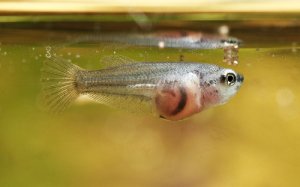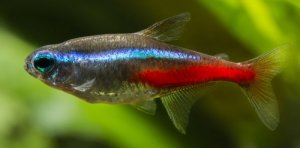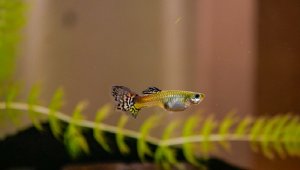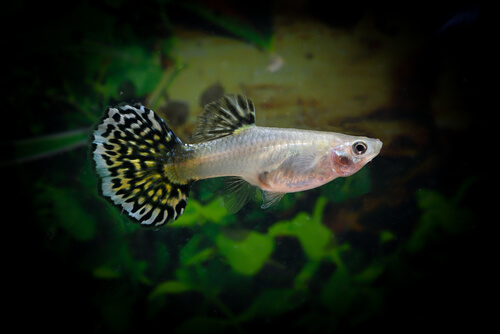
If you’ve been around fish long enough, you have most likely noticed that almost every aquarium has a guppy fish. These freshwater beauties are famous because they are loved for their long fins and bright colors. Additionally, guppies are among the easiest domestic fish to care for. Nevertheless, like other fish species, they also have their own typical guppy fish behavior before death.
When your fish is close to death, you’re likely to see it moving less and other physically visible signs. So it makes sense that you would be concerned if your guppy fish stopped being as alert and active as they usually do. This is definitely out of character for them.
We’ll outline the most important guppy fish behavior before death and health concerns to look out for in this article and hopefully help you prevent your pet from going into distress.
8 Common Signs And Symptoms Of Guppy Fish Behavior Before Death
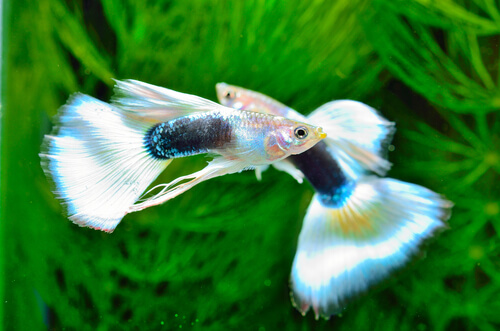
1. Protruding Eyes
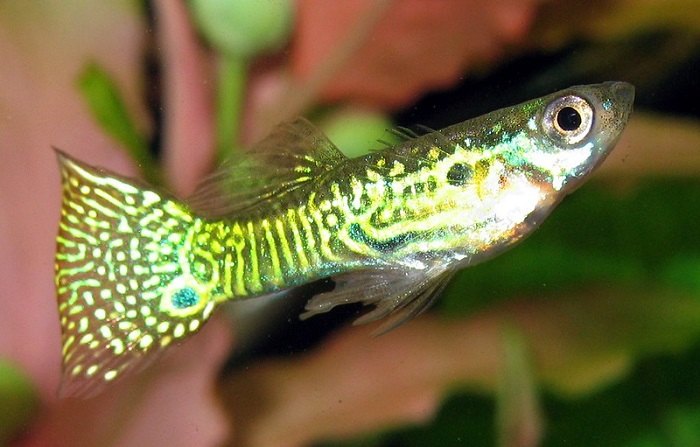
Your guppy having a protruding eye is something you should take very seriously. A bulging eye is not normal in this fish and usually indicates that there is something wrong with them. The most common reason your aquatic friend is suddenly displaying this symptom is that it may have Popeye. Injury, infection, poor water quality, and internal parasites are the leading causes of Popeye.
When your guppy has this condition, you will also notice that the affected eyes may also appear cloudy. The eyeball itself may have a white film. The protruding eyes may completely pop out of the socket in severe cases. Untreated Popeye can lead to ruptured eyes and blindness in guppies and can be one of the causes of guppy fish death.
2. Swimming Upside Down
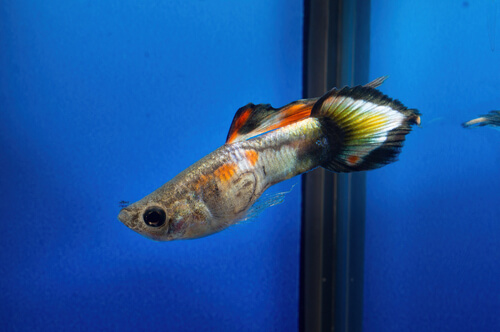
Your guppy, like other fish, has a swim bladder that controls buoyancy. The most likely cause of your fish swimming upside down is a condition known as “swim bladder disease.” Swim bladder disease is relatively common in fish and can occur in them for a number of reasons.
Although swim bladder disease could be the problem, don’t overlook other reasons your fish is belly up. High levels of nitrates, poor water quality, poor nutrition, and other diseases could be causing your fish to react this way. It’s essential to note that swimming upside down is a common guppy fish behavior before death. If whatever is affecting your fish is not attended to, this could possibly end in your pet’s death.
3. Red Gills
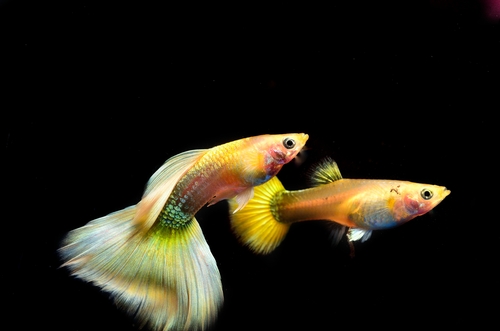
Gills play an essential function for all fish as they use this to breathe. High levels of ammonia, nitrate, or carbonate poisoning are the likely cause of red gills in guppies. Your guppy may also display other concerning symptoms when struggling with poisoning. Watch out for gasping for air, lethargy, and loss of appetite.
The natural color of guppy gills is usually pinkish. However, if you find your fish’s gills are more of an intense red and look like they could be bleeding, then they may have gill flukes. This disease will stress your fish as it does affect your pet’s breathing. Continued difficulty breathing can lead to sudden guppy fish death.
4. Loss Of Appetite
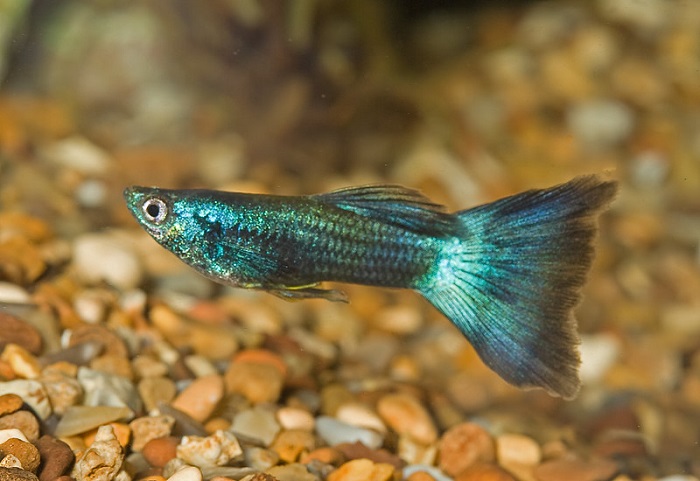
Lack of appetite is a common symptom your guppy fish display when distressed. Your beloved pet could not be feeding for many reasons, such as water quality, illness, low oxygen levels, bullying, and poor food quality.
If one or more of these reasons is the cause, your fish will display other signs that will validate the loss of appetite. Look out for lethargy, markings on the body, erratic swimming, and many other expected guppy fish behavior before death. It is essential that the problem is identified and fixed quickly. Your guppy needs the nutrients it gets from food to survive.
5. Stress In Guppy Fish
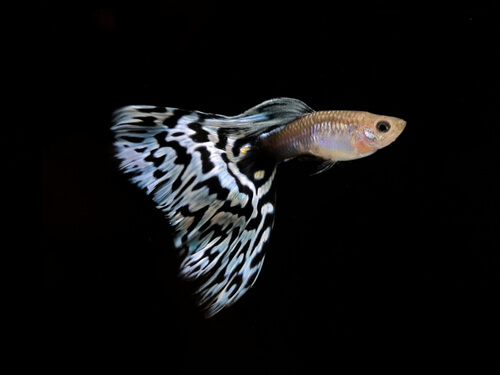
Guppy fish are generally happy creatures that swim around cheerfully. When your aquatic friend is stressed by one or many factors, you will be able to see it right away. Your pet will usually appear stressed if its environment is not conducive to its needs.
Water pH levels play an important role in the overall health of your fish. Always ensure your guppy fish has a clean tank with suitable water changes. Inadequate pH levels will result in breathing difficulty for your fish, causing it to stress. In addition, check that your male-to-female ratio is at a reasonable rate. For example, a ratio of 1 male to every 3 females will eliminate bullying, another stress factor.
6. Discoloration
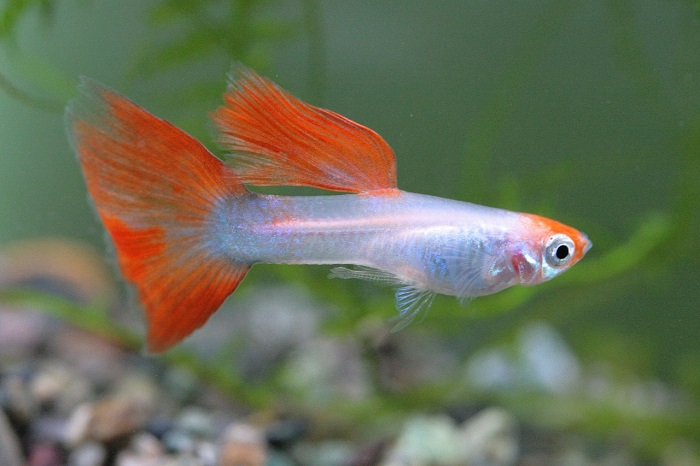
Normally guppy fish are brightly colored pets that are certainly pleasing to look at. But when they begin to lose their luster and appear dull, you may be dealing with a sick guppy. In addition, other critical factors may contribute to color change, such as the guppy’s age, infections or parasites, and the level of stress your guppy is experiencing.
One of the other usual factors is the water parameters of the tank. Guppies can withstand much harsher conditions than some other fish. However, they still have limits when it comes to the amount of toxins they can tolerate.
7. Clamped Fins
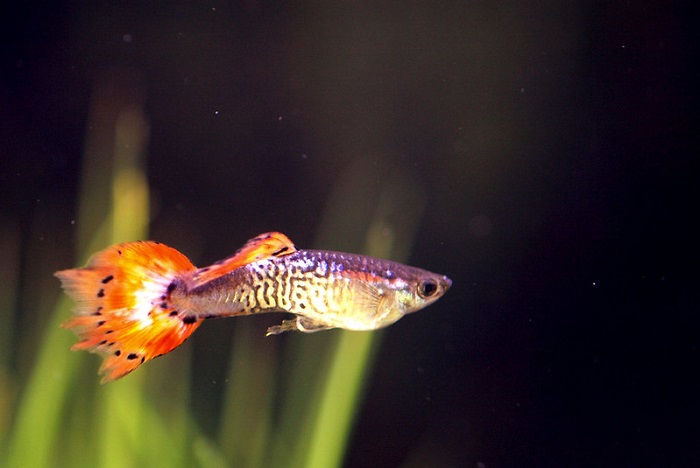
When suffering from clamped fins, guppies tend to keep the fins as close to their bodies as possible and won’t open them. Clamped fins may be the first sign that a fish is ill because this is a typical guppy fish behavior before death.
It is fairly easy to spot clamped fins in guppies because of their fins’ size in relation to their body. Water quality, water temperature, ich, and velvet are the four most frequent causes of clamped fins in guppies. Ensuring you have the right equipment to monitor water quality and water temperature will help you ensure your fish don’t experience clamped fin. If due to illnesses like ich and velvet, immediate treatment will fix the problem.
8. Swollen Abdomen
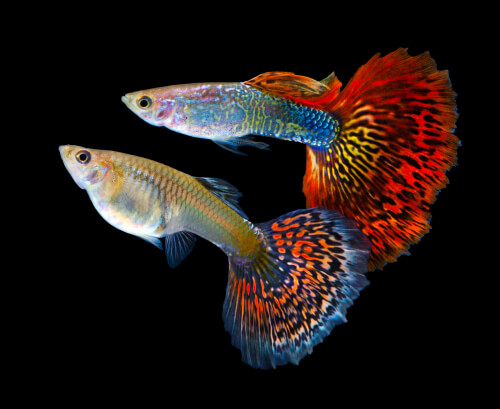
A bloated guppy is not something you’ll easily miss. Even if you’re not constantly monitoring them, you will be able to notice their protruding bellies when you catch a glimpse of your tank. Although not always, an enlarged abdomen in guppy fish can sometimes be cause for concern.
There are few causes for swollen bellies, and it is often hard to spot the cause. The most common reasons for this change in your pet’s abdomen are constipation or dropsy. However, they can become bloated and constipated if they don’t consume enough dietary fiber and are fed meals that cause bloat in their stomachs.
Is My Guppy Fish Asleep Or Dead?
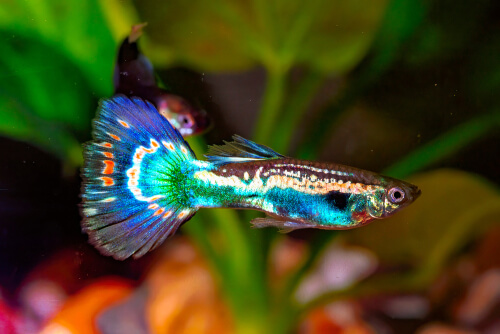
Realizing that your fish is dead is every aquarium enthusiast’s most dreaded experience. So how can you determine whether your guppy is alive or dead?
- Behavior: There is a probability that there is something wrong with your guppy fish if you find it frozen in its territory or drifting motionlessly. In addition, if you feed your fish, you will easily detect if it’s not acting normally when it doesn’t swim to the food. This could be a sign that your fish is dead.
- Physical appearance: If you notice a few physical signs with your fish, it is very likely that your fish is dead. These signs are the fish’s scale condition, lack of movement of the gills, sunken eyes, hazy pupils, and lack of struggle when touched.
Check your fish’s tank conditions, especially the water parameters, as soon as you notice they are not sleeping correctly. Test the ammonia levels in the tank water because too much of it can be one of the causes of guppy fish death.
What Are Treatable Guppy Conditions?
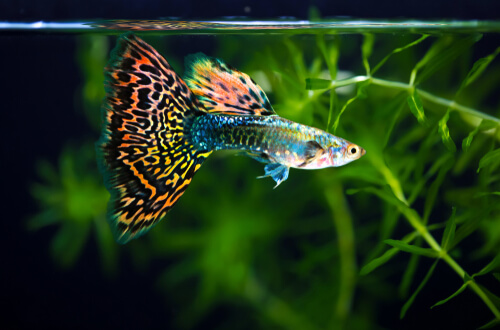
Guppy fish are known to get sick occasionally. Fortunately, a lot of the infections they contract are treatable. Here are a few treatable diseases in guppy fish you may come across:
1. Columnaris
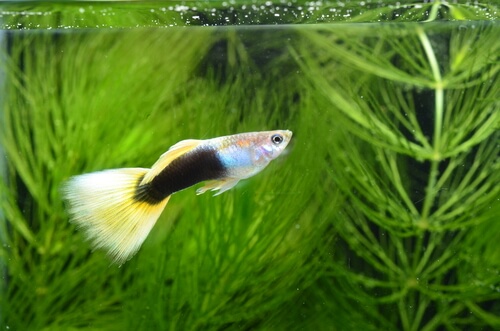
Columnaris is a bacteria that is often mistaken for a fungus. If your guppy fish has this disease, you are likely to see a large white spot at the mouth or midsection. Some of the other most common signs of this infection are your fish not moving and loss of appetite. This bacteria spreads quickly and primarily affects female guppies, but it can also infect male guppies.
It is one of the leading causes of sudden guppy fish death, so you should act fast with treatment to prevent the condition from getting worse. Your entire fish colony could be wiped out if you don’t handle this infection properly.
2. Fungus
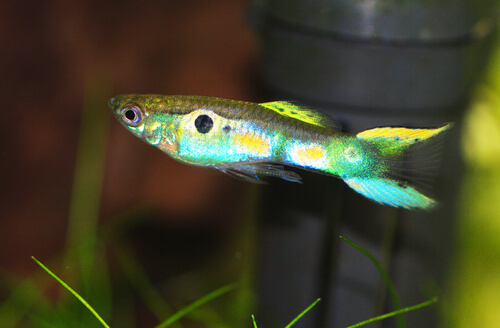
A fungus is a colorless plant that takes the form of whitish cotton wool on the fins or body of guppy fish. The majority of fungus incidents happen in sick and frail fish with prior skin or fin injury. In addition, a weak immune system that can be caused by a poor diet or poor water conditions can lead to fungus on your fish. Finally, check that the water is not too cold, as this can also lead to your fish dealing with this.
3. Ich
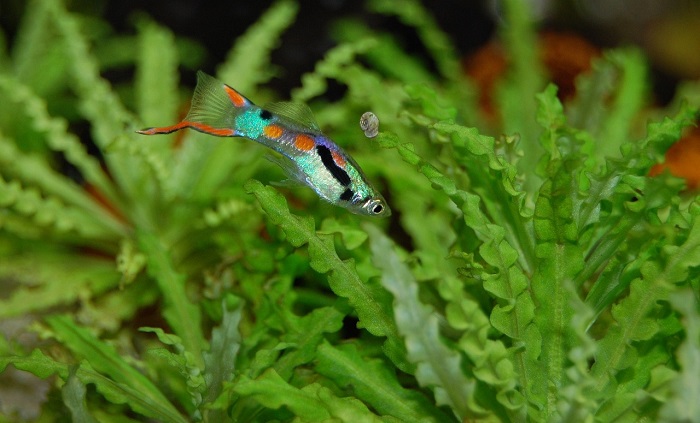
Guppies frequently contract this white spot illness, also known as ich. Ich is an illness brought on by the parasite Ichthyophthirius Multifilis. Because these parasites form cysts on the skin, your fish will have white spots on their fins and skin. Parasites thrive in inadequate water that has an unbalanced pH and variable temperatures. This increases the risk of ich disease in your fish.
Common symptoms of this disease are your fish rubbing up against tank objects to shake off the parasite, as well as lethargy and loss of appetite.
4. Hexamitiasis
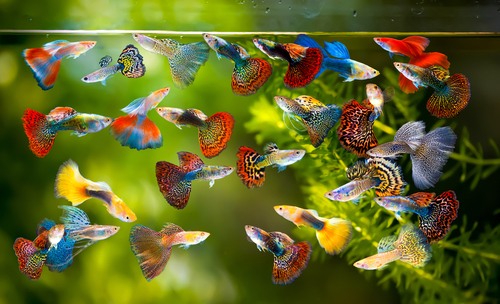
Hexamita, a protozoan parasite, is the leading cause of Hexamitiasis. These usually benign protozoa are found in the intestines. The protozoa flare up when the immune system of your guppy fish deteriorates. Suppose your tank is overcrowded with poor filtration, insufficient water changes, and low oxygen levels. In that case, your guppy fish are likely to encounter this disease.
Holes in the body and head, white and stringy feces, pale bodies, damaged fins, and refusal to feed are all signs of this illness.
Final Thoughts
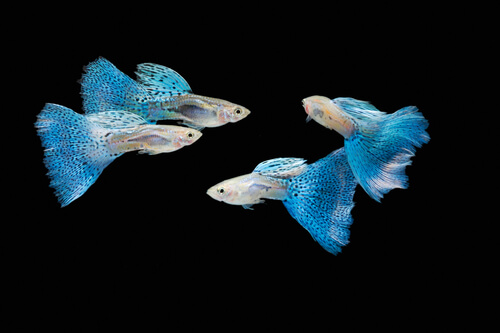
Once you’ve gotten accustomed to them, guppies are actually rather simple to manage. First, offer your aquatic friends a varied diet, add plants and ornaments to their tanks, and check water parameters regularly to keep them comfortable. Then, to ensure that your water quality is at its best, just be sure to establish a routine of performing a 25% water change every one to two weeks.


